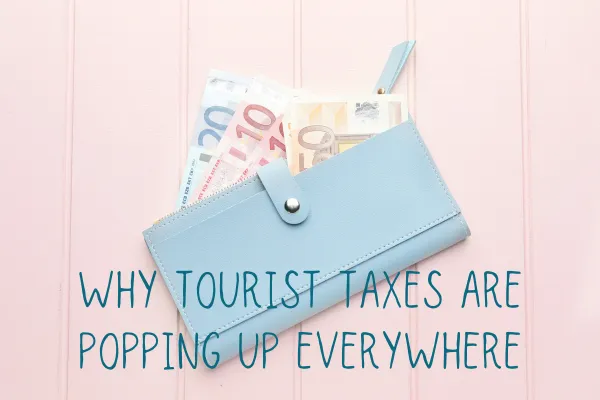
Why Tourist Taxes Are Popping Up Everywhere(and what it means for your next trip)
You’ve probably noticed it when booking a hotel or buying a plane ticket lately — that sneaky extra fee tagged on at the end that makes you pause and think, “Wait, what’s this now?” Yep, that’s the tourist tax, and it’s becoming the new normal across the globe.
But it’s not just there to annoy you (even though it can feel like one more thing nibbling at your travel budget). Tourist taxes are actually part of a bigger story about how destinations are trying to cope with the rise of global travel and its impacts.
What’s a Tourist Tax, anyway?
Essentially a tourist tax is exactly what it sounds like: an extra charge you pay when visiting a place. It can show up in different ways — maybe as a nightly fee at your hotel, an airport departure charge, or even an entrance fee to a city or natural park.
Although it may feel like a random cash grab, most destinations use (or say they use) the money to tackle the challenges that come with welcoming millions of visitors — like worn-down streets, insufficient sewer systems, crowded public transport, or mountains of extra trash (glamorous, right?).
Tourist taxes come in all shapes and sizes:
Hotel or accommodation taxes: Probably the most common. Cities like Rome, Paris, and Barcelona add a few euros per night to your bill, depending on where you’re staying. Whilst the Balearic Islands have recently announced a hike of between 60-200% on their tax during the months of June, July and August and scrapping it on January and February.
Airport or border taxes: Some countries will add a fee when you enter or leave, like Japan’s “Sayonara Tax” (about $7.50 USD) when you wave goodbye to Tokyo and airports charge taxes that airports are used to pay for the operation and maintenance of the airport.
City entrance fees: Venice is going next-level with this — charging day-trippers a €4 fee just to visit the historic city centre, when not staying overnight.
Eco taxes or Green taxes: Heading somewhere wild and beautiful, like the Galápagos Islands, Mexico or Bhutan? You’ll likely chip in to help preserve the natural environment and impacts tourism can have on it.
Who’s Doing It?
The short answer? A lot of places. Here’s a quick world tour:
🌍 Europe is big on this and getting bigger! Almost every major city you can think of — Paris, Berlin, Amsterdam, Barcelona, Athens, Prague...the list goes on, all have some form of tourist levy. It’s usually a few extra euros per night, but it adds up but as the Balearic Islands have recently shown it's forefront for the decision makers of these tourist hotspots.
🗾 Japan introduced the departure tax in recent years, and it’s all about supporting tourism infrastructure and cultural sites. Other countries with departure taxes include Australia, Dominican Republic and Costa Rica. In other countries very often these taxes feel less intrusive as they are included in flight prices
🌴 Bali just rolled out a $10 USD fee for foreign visitors in 2024 to help protect its culture and stunning landscapes.
🇳🇿 New Zealand charges most visitors $35 NZD to fund conservation and improve tourism facilities.
🇧🇹 And then there’s Bhutan, which has always played by its own rules. Their whopping daily “Sustainable Development Fee” (think $100+ per day 😱) is part of their “high value, low impact” philosophy — keeping mass tourism at bay.
Why Now?
With overtourism becoming a buzzword in places like Venice, Mallorca and Barcelona, cities are looking for ways to balance tourism with the well-being of locals and the environment. Plus, after COVID-19 shut everything down, governments are eager to rebuild — and tourism is a cash cow.
Many places are also focusing on sustainable tourism, meaning they want to make sure visitors contribute to maintaining what makes a destination special (and not just take pretty Instagram shots). It's the "Leave only footprints, take only memories" ethos of holidaying.
The Debate: Helpful or Just Another Annoying Fee?
Like most things, there’s some drama. Budget travellers and backpackers sometimes feel unfairly targeted, while businesses worry it could put off visitors entirely. On the flip side, many locals are cheering — because without some limits and funding, popular tourist spots risk becoming overcrowded theme parks.
So all this leads to the big questions: Is the money being spent on making tourism better or does it put people off booking for those areas?
Join me for chat about how I can help you with your next holiday or travel plans. I'm friendly, informal, and love to get to the bottom of what makes the perfect holiday for you. These chats are totally free and there's no obligation to continue to use my services.
Book your 30 minute chat by clicking the link - Holiday chat booking link

